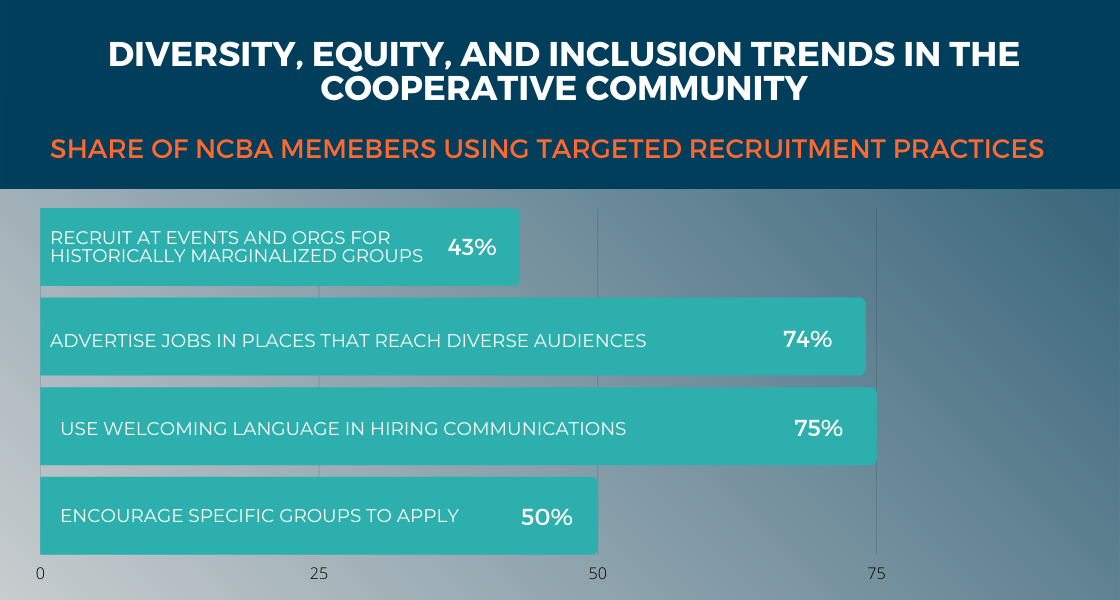|
Co-op Spotlight: Community Kitchen Co-op
|
|
|
|
What do you do when a global pandemic shuts down the only farm to table restaurant for miles around? You start a cooperative, naturally. A multi-stakeholder cooperative owned both by the workers from the kitchen and the producers who formerly supplied ingredients. And the cooperative offers a prepared meal subscription program – with home delivery! – using almost all locally-sourced ingredients. Naturally. The founding members of Community Kitchen Co-op (CKC) knew each other well thanks to robust local food system networks and organizations in southwestern Wisconsin. In addition to their connection through the former Cow & Quince restaurant in New Glarus, they are also members of and active participants in organizations like the Wisconsin Farmers Union and Soil Sisters of Wisconsin. They also are self-described activists, innovators, and entrepreneurs when it comes to supporting local food systems and family farms.
|
|
|
|
The CKC is about more than just a solution to a pandemic-created problem, however. Its producer and worker members believe passionately in fair wages across the food supply chain, and the right of people in their communities, regardless of income, to be able to access healthy, locally produced food. Their mission and vision go way beyond the geographical limits of their delivery area in Dane, Green, Lafayette and Rock Counties. Their long-term vision includes leading “a collaborative agricultural, environmental, educational, community-building and wellness-focused movement” and to “support the responsible positioning of our community to face climate change, from seed to table."
|
|
|
|
Cabbage rolls getting prepared
|
Worker owners, Pat Skogen and Dela Ends, load up the van with delicious meals for delivery.
|
|
|
|
While only in their third month of operations out of their kitchen and retail space in Monticello, WI, CKC’s founders spent a year and a half piloting the idea and building financial and other support to get it off the ground. To date they have received a South Central Wisconsin Farmers Union chapter local initiative grant, a Food, Faith and Farming Network Seed Money Grant, and a Wisconsin Economic Development Corporation Capital Catalyst Grant (administered through Green County Development Corporation) to support seasonal preservation infrastructure and a fully sustainable packaging system. They also have a Compeer Financial Operating and Equipment Loan and created their own Community Investor Loan program. UWCC’s cooperative development specialist Kelly Maynard has been actively supporting the co-op since its first virtual meetings in the spring of 2020. And Andy Larsen from UW Extension’s Food Finance Institute provides ongoing guidance with their financial projections and budgeting. They are a prime example of the way a web of local financing programs and technical assistance organizations can provide a solid foundation for an innovative small business to launch, create jobs, and contribute back to the local economy.
|
|
|
|
|
|
UWCC Staff: New Beginnings
2021 has brought several updates for UWCC staff including new faces, opportunities, and leadership roles:
|
|
|
|
Kristin Forde will join the UW Center for Cooperatives in mid- December to provide cooperative development services to Wisconsinites interested in starting co-ops. Kristin arrived to the worker co-op world via taxi in 2004 as a Union Cab member. While working as a cab driver, she helped launch member education initiatives, participated in newly developed cooperative grievance procedures and conflict resolution systems, was a founding member of Madison Worker Cooperatives (MadWorC), served as board president for one term, and participated in the planning of Madison's first Cooperative Business Conference in 2012. She comes to UWCC after working for ten years in a non-profit agency providing and managing crisis childcare. We are thrilled to have Kristin bring her passion for helping people and supporting cooperatives to our team!
|
|
|
|
One of UWCC's cooperative development specialists, Esther West, is moving on to pursue another exciting opportunity: launching a new worker cooperative! Esther is a co-founding member of a new worker co-op called The Ajani Group. The co-op will provide innovative education, business support services, urban planning analysis and more to fellow cooperators nationally, particularly in disinvested and Black, Indigenous, and People of Color (BIPOC) communities. Esther started at UWCC in 2018 and led many important initiatives such as the National Cooperative Resource Ecosystem Map, research on the factors that contribute to new cooperative development, conducting the first national compilation of U.S. Latinx cooperatives, relaunch and update of the Wisconsin Co-op Directory, and helped many worker cooperatives across the state and nationally. In addition to their fantastic work, we will miss their passion and commitment to the broader worker co-op community, exceptional selfie abilities, procurement of fair trade, cooperatively made chocolate and tea, and all around just being an awesome human.
|

|
|
|
|
|
|
Additionally, our colleague Jack Kear decided to go back to his teaching roots for a national healthcare software company. Jack started in November 2019 as a communications and events associate providing support for what we thought would be UWCC's many in person events in 2020 and 2021. But with the pandemic, Jack pivoted with grace and humor, learned new systems on the fly including developing an online scavenger hunt, video editing, and assisting with developing new engagement activities for social media and UWCC's virtual events. We will miss his dry sense of humor, affinity for friendly wagers (that he almost always won), and his excellent recommendations on local food offerings.
|
|
|
|
Finally, we are pleased to announce that Charity Schmidt, a cooperative development specialist at UWCC, was elected to the board of the Association of Cooperative Educators. We are excited for Charity to bring her worker cooperative lens to cooperative education. She additionally serves on the boards of MadWorc, the peer to peer network of Madison worker cooperatives, and Worker Justice WI, which builds collective worker power through training, labor rights education, collective action, and community engagement. Congratulations Charity!
|
|
|
|
|
|
|
|
|
|
|
UWCC Shares Findings from Survey About Diversity, Equity, and Inclusion Practices Across Cooperative Sectors
|
|
|
|
An enthusiastic rate of participation in the survey (39 percent) and data about the practices and goals of participating cooperatives related to diversity, equity, and inclusion (DEI) practices, democratic governance and empowerment, and the financial security and advancement of workers suggest a high level of interest in these issues among NCBA CLUSA members and supporters. For instance:
- 76 percent described improving DEI as very or extremely important to their organization in the next five years.
- At least half have specific five-year organizational goals related to diversity, equity, and/or inclusion.
- 71 percent expressed interest in participating in the peer learning cohort facilitated by NCBA CLUSA to delve deeper into DEI practices at their cooperative.
In this report, you will find the following information:
- Prevalence of DEI practices to address inequality in the workplace.
- Prevalence of DEI practices for cooperative boards, members, and the broader community.
- Potential strategies to operationalize the cooperative values of equality, equity, and solidarity.
Dr. Hanson Schlachter participated in a webinar discussion of new survey results that reveal how co-ops are doing as they seek to implement best practices in diversity, equity and inclusion (DEI).
|

|
|
|
|

|
We are thrilled to announce that CCMA 2022 will be in person! Please mark your calendars for June 9-11, 2022, in Sioux Falls, South Dakota.
So much has happened to our co-ops, communities, and the world since we last gathered in person in Durham in 2019. We are looking forward to bringing cooperators together again for engaging keynotes, breakout sessions featuring your cooperative peers, co-op tours, awards recognizing the leadership and vision of the cooperative community, networking, swapping co-op stories over a glass of wine, and hugs, just to name a few!
|
|
|
|
|
|
|
In Brief: Updates and Resources
Grants for Feasibility Studies Soon to be Available
The most recent Wisconsin state budget included $200,000 annually to help fund cooperative feasibility studies in Wisconsin. UWCC is working with the Wisconsin Economic Development Corporation and Cooperative Network to create a grant program to disburse these funds. We hope to be able to launch the program in early 2022. If you would like to receive updates on the grant program, including the first call for proposals, please contact Kelly Maynard, kelly.maynard@wisc.edu to be added to the distribution list.
Forestry Cooperative Grants Available
UWCC is pleased to invite proposals to receive $5,000 - $25,000 to fund development of Wisconsin-based cooperatives or cooperative groups (e.g., associations, networks, informal collaborations) in the following areas: forest management, forest-related products, biomass energy, forest-owner policy initiatives, and support for existing forestry cooperatives or associations. Proposals are due February 11, 2022. See announcement and application.
Wisconsin Co-op Directory Updated
In 2021, UWCC staff updated the Wisconsin Cooperative Directory enhancing user's ability to look at cooperatives through interactive mapping. Wisconsin boasts a diverse cooperative economy with cooperatives in a range of industries including but not limited to health care, agriculture, insurance, finance, education, grocery, and energy. Wisconsin is fortunate to be home to 728 cooperatives. The two most common types of cooperatives in Wisconsin are consumer-owned (56%) and producer-owned (29%). Visit the Directory.
Farmer Cooperatives Conference Highlights Innovation
This year's Farmer Cooperatives Conference welcomed nearly 180 cooperators from across the country to explore the current issues impacting farmer cooperatives and share innovative solutions. Due to the COVID-19 pandemic, the event was held virtually for the second time highlighting issues such as competitive strategies using alternative business models, innovations in management structure, and cybersecurity and ransomware.
|
|
|
|
|
|
|
|
Onboarding with Purpose: Systems and Strategies for Successfully Integrating New Directors
December 9, 2021, 10:30 - 12:00 p.m. CT
Webinar
This webinar by UWCC Executive Director Courtney Berner will explore the ins and outs of director onboarding, a critical component of sustaining a healthy and productive board of directors. The webinar will address why orienting new directors is so important and offer tangible ways cooperatives can improve their own director onboarding and education programs. There is no cost to participate, however, registration is required.
|
|
|
Co-op Governance Highlights and Trends: A First Look at Results from the Cooperative Governance Survey
January 31, 2022, 1-2 p.m. CT
Webinar
In October, UWCC invited over 4,400 U.S. cooperatives to be a part of an ambitious new study to examine governance practices across sectors and over time. This webinar will provide a sneak peek at findings from the first Cooperative Governance Research Initiative (CGRI) survey. Dr. Laura Hanson Schlachter will share takeaways from our preliminary analysis of survey data and invite participants to help identify key themes to explore deeper in follow-up interviews. Courtney Berner will also share how our research team plans to use CGRI data to develop practical tools to help cooperatives of all kinds advance their governance practices.
|
|
|
Agricultural Cooperative Director Training 2022
January 4-5, 2022 - Mankato, MN
January 10-11, 2022 - Baraboo, WI
Minnesota and Wisconsin are pleased to host ag co-op directors in person for a highly interactive, small group director training. Topics include a look at how boards might handle employee issues brought up by a director, what types of things should boards consider having in a written contract for their CEO or General Manager, what a board should know about its balance sheet and its ability to handle risky events like cyber security, and current trends in energy and their impact on a cooperative’s energy portfolio.
|
|
|
CCMA 2022
June 9-11, 2022
Sioux Falls, South Dakota
The Consumer Cooperative Management Association (CCMA) conference is the annual national gathering of food cooperative leaders that features 30 educational sessions from co-op peers, inspiring keynotes, tours, and networking. After two years hosting virtually, we are thrilled to bring cooperators back together in person!
|
|
|
|
|
|
|